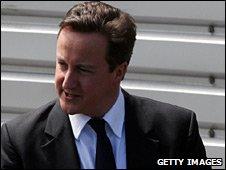Cameron will campaign against vote system change
- Published

Mr Cameron opposes changing the voting system
David Cameron will campaign against changing the voting system, his spokesman said, in a referendum expected next May.
His spokesman said the PM would be asked his view and "clearly his view is that he's not in favour of it".
An agreement to hold a referendum on changing the voting system to the "alternative vote" (AV) was a key part of the Tory-Lib Dem coalition deal.
But it must go through Parliament where many Tory and Labour MPs oppose AV.
The BBC understands a referendum on changing from the current first-past-the-post system to AV is planned for 5 May 2011 - a date expected to be confirmed at cabinet on Tuesday. A Referendum Bill is expected this autumn.
Opposite sides
It would mean the referendum is held on the same day as the Scottish parliament and Welsh assembly and English local elections.
Mr Cameron's spokesman said on Friday that the referendum commitment was "central to the coalition government's programme".
But he said: "He will be campaigning against AV. I can't predict precisely how the campaign will unfold but clearly he is going to be asked his views during that campaign and he will make them clear.
"His view is that he is not in favour of it."
Mr Cameron suggested to the Sunday Times last month he would not play an active role in the "no" campaign adding: "I will have other things to do as well."
Most Conservative MPs are against a change to AV - but they will be expected to vote for the referendum bill as it was a key component of the coalition deal with the Liberal Democracts, who do want it. Tory MPs will then be free to campaign against AV in the referendum.
The Conservatives argue the existing first-past-the-post system guarantees strong, stable government, while Lib Dems argue it is unfair on smaller parties and allows candidates to be elected on the support of only a minority of constituents.
Under the proposed AV system, voters rank candidates in order of preference. Anyone getting more than 50% in the first round is elected, otherwise the candidate with the fewest votes is eliminated and voters' second choices allocated to those remaining. This process continues until a winner emerges.
The Lib Dems would prefer a different voting system - the Single Transferable Vote - which they believe is a more proportional system than AV.
But speaking before the general election, Lib Dem leader Nick Clegg told the Independent: "AV is a baby step in the right direction - only because nothing can be worse than the status quo."
'Great sway'
Conservative MP Daniel Kawczynski, chairman of the all-party group for the promotion of first-past-the-post, said he would campaign "vigorously" against AV but would not vote against holding a referendum.
But he said he would "love" David Cameron to campaign against AV in the build-up to the vote: "I think he would hold great sway in such a referendum."
Conservative MP Bernard Jenkin will be another leading figure in the "no" campaign but told the BBC he would vote for a referendum in the Commons, as he believed Conservative MPs were "morally obliged" to do so, because of the coalition deal.
However, he said he was "astonished" at the proposed date - that of the Scottish Parliament and Welsh Assembly elections: "It's clearly an attempt to stoke the turnout in areas of the country that already have different voting systems where, I presume, they think there will be less resistance to change to the UK system."
Lib Dem deputy leader Simon Hughes, who wants electoral reform, said he believed it was a "campaign that can be won".
'We will win'
"I believe that next year we will move, I think, to a more progressive politics and the coalition government will be stronger as a result."
Asked if the Lib Dems would leave the coalition if they lost the referendum, he said: "I think we will win it."
It is thought the referendum will be linked to Conservative plans to change constituency boundaries which they say will make seats more "equal" - Labour say the plans are designed to eliminate their smaller inner-city seats.
Labour leadership candidates David Miliband and Ed Balls say they support AV - but not if it means what they see as "gerrymandering".
Mr Miliband said he would back a referendum, but not if it meant reducing the number of constituencies: "What's very important is that we don't confuse a good proposal to ensure every MP has 50% of the vote with a Tory-Liberal Democrat plan to gerrymander the British constitution by reducing the number of Labour seats."
His leadership rival Ed Balls said he was concerned that the government was "choosing to push this through" alongside boundary changes.
Mr Miliband's brother Ed, another leadership candidate, also said he "strongly" supported the case for introducing AV "to ensure greater fairness for voters and greater legitimacy for our MPs".
But another leadership candidate, shadow health secretary Andy Burnham, told the Guardian: "It is not my party's job to prop up the Liberal Democrats by helping them win a referendum that is important to them." The remaining candidate, Diane Abbott, did not comment about the referendum.
Campaign group the Electoral Reform Society welcomed the news as "a real chance for change".
- Published2 July 2010
- Published2 July 2010
- Published2 July 2010